We noted in the first Wild Africa Trek post that nick was concerned about crossing the rope bridges. Nick has a fear of heights. Plus as he has gotten older he has had a couple of vertigo episodes. As we approached the first rope bridge, nick knew he would not be taking any photos WHILE he crossed the bridges, but he did get some before we stepped onto the first bridge.
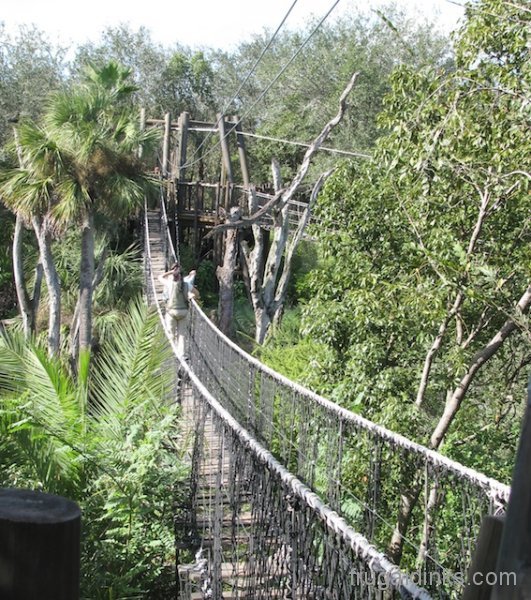
Before stepping onto the first bridge…
Here, you can see the full layout. Once you cross this quite long first bridge, you stop on a platform; the tour guide will help with your harness so that you’re never “unhooked.” Then you turn right and cross the second bridge. The first bridge crosses the hippo pool and the second goes over the crocodiles.
The bridge doesn’t look very high from this vantage point, but here’s another look. Also, keep in mind that this isn’t the highest spot on the bridge…
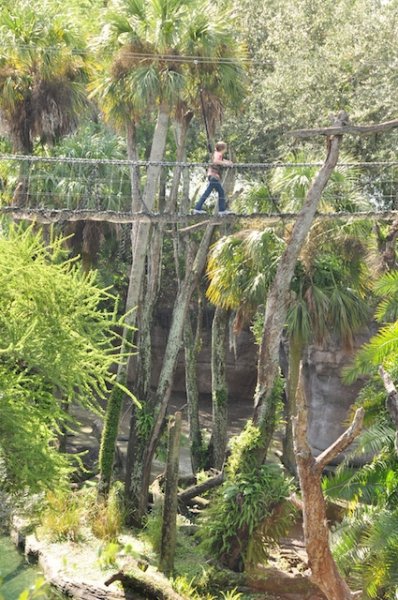
Another trekker crossing the first bridge
Our intrepid companions, K2, were excited to go. So… being good hosts, we let them go ahead of us. You can see the harness which goes up and attaches to the safety line. If the safety harness is ever “deployed,” it must be replaced. It is not a bungee (although it looks like one) but according to our guides it does have “give.” This is so that you’re not “jerked” to a stop, the sudden deceleration might cause injuries. IF you fall, you’ll fall a short distance while the mechanism increases tension gradually to stop your decent. There’s a mechanism much like a airbag in your car contained in the thick part of line (immediately above the connection), this is what actually “deploys” to make the whole apparatus work properly.
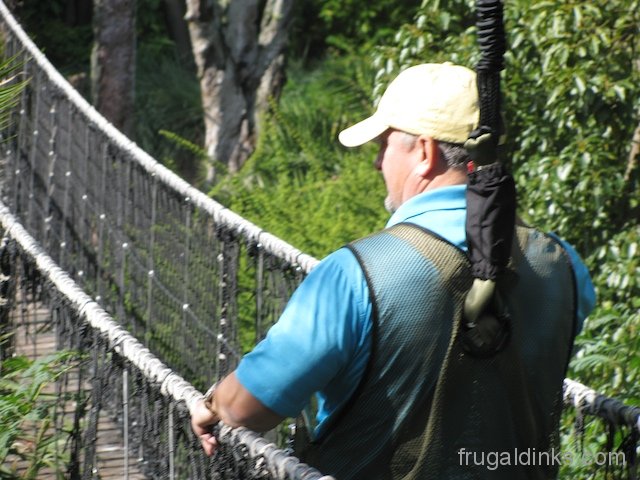
The first half of K2 starts across the bridge
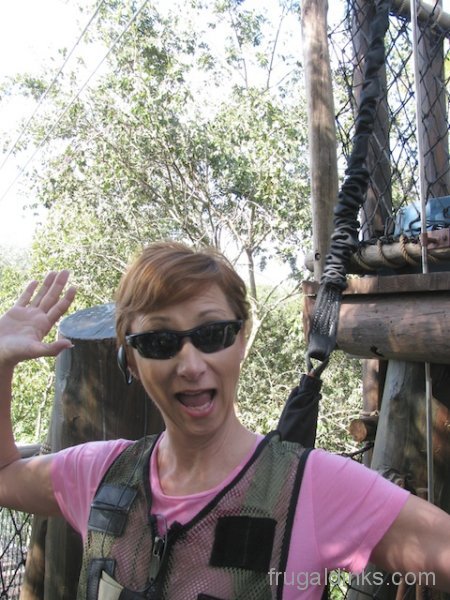
“Okay, me next, me next!” the second half of K2 is really eager to go!
Nick was not this excited – okay, nick was white with fear! Nora was just nervous…
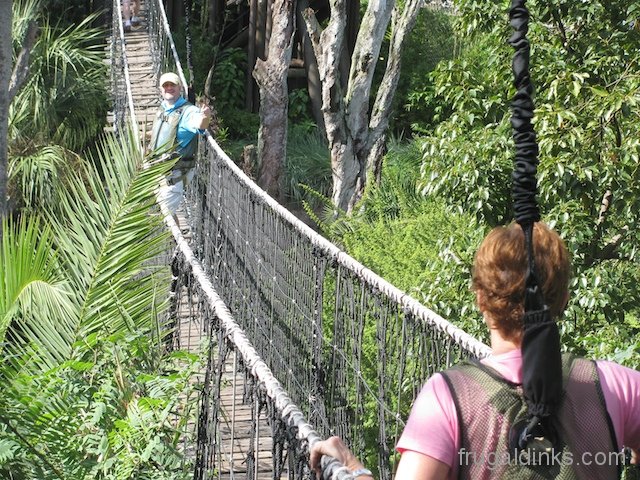
Come on, wait till you see the view! Don’t be scared.
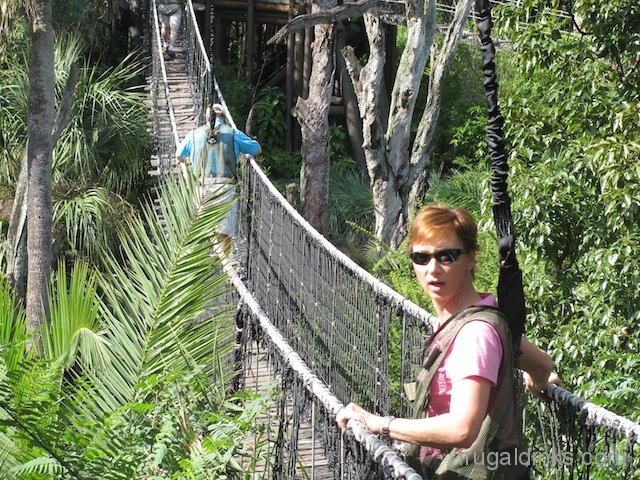
It’s an adventure! It’s fun!
Why all the drama? After all, this is Disney World, you know it’s safe and that they made every precaution to ensure that you enjoy yourself. Here’s why so much drama… the rope bridge planks are really random with some steps quite far apart; we don’t know how short-legged people manage. Once she started across, nora was concerned that she’d miss one of the planks and skin her shins on the boards (and look like a silly whining fool). Plus the netting on the sides is not complete – there are areas where there is not much between you and a fall (a hand “rope” and some very thin wires). It is easy to forget you have a harness on, by this point you’ve been wearing it for a while. Even if you remember, do you really want to test its effectiveness? We surely didn’t want to test it! But, look at that view of the hippo pool.
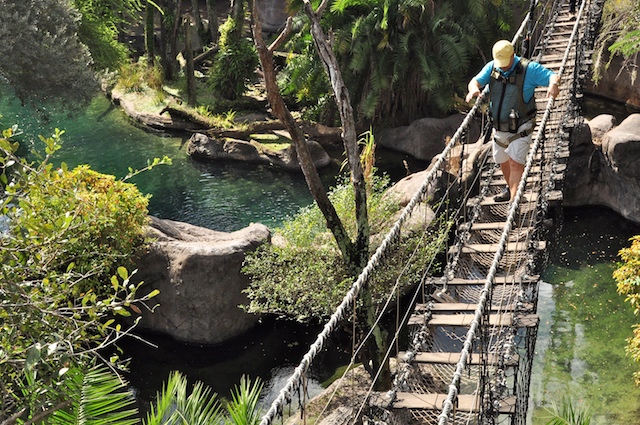
Making your way across may be exhilarating or a little scary. After you cross over the “road” where the regular Kilimanjo Safari travels, there’s quite a drop off over the hippo pool!
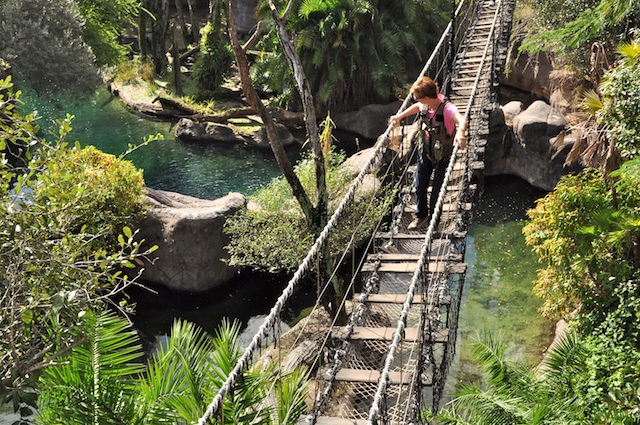
Wait, where are the hippos? I’m not letting go, but where are they!
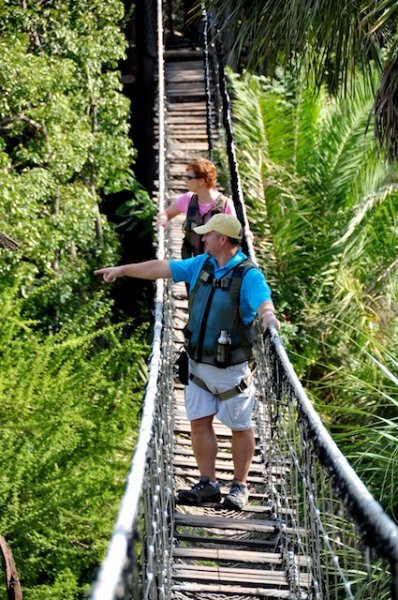
K2 were clearly enjoying themselves and taking in all of the sights, we didn’t dare get that close to each other on the bridge OR slow down/stop to enjoy the views
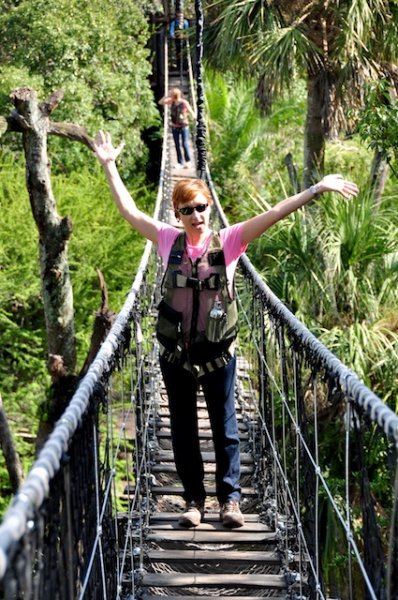
What was I thinking? That was fun and it was easy – bring on the crocodiles!
Okay, you asked for it – here come the crocodiles. Unlike the hippos, the crocodiles were easy to spot. Plus this bridge was not as “high” as the one over the hippos.
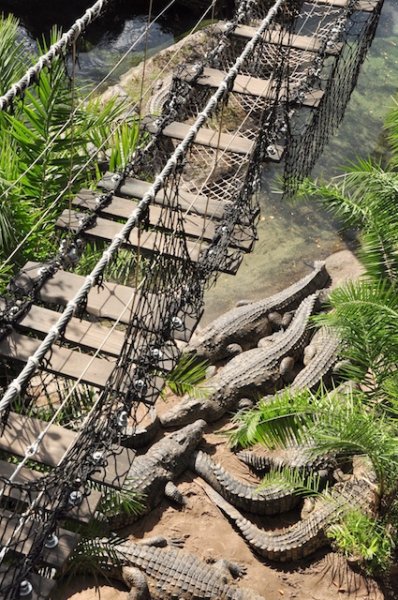
BIG crocodiles underneath the bridge
The only photo we have of our guides (not in a group), Chris and Lauren, as they were crossing the crocodiles. They were the last across and somehow we had picked up an extra guide to take photos of the crocodile bridge crossings.
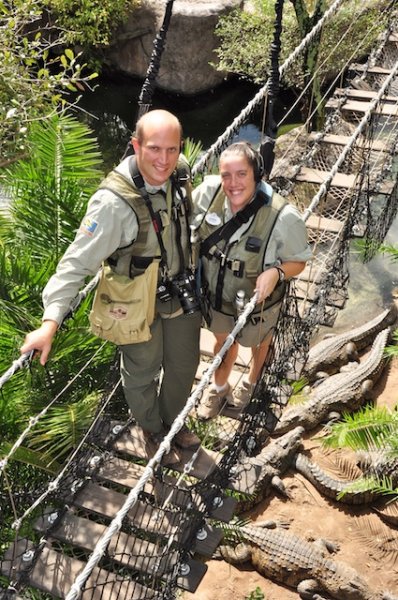
Our guides: Chris and Lauren
After we finished the crossing we got to go into the crocodile habitat and hang out over the crocodiles (hooked up to a metal rail again). Up until this point, we had thought that the vast majority of the crocodiles were “disney crocodiles” (in other words, maybe one or two were real and all of the rest were imagineered); we’ve been on the Kilimanjaro Safari many times and the danged things just don’t move (nora thinks they’re like the ones on the Jungle Cruise, only better modeled and more lifelike). WRONG – they are all real, honest-to-goodness live crocodiles. Since we had time to look and ask questions we saw a few move; one “yawned”, the guide said that was how they control body heat.
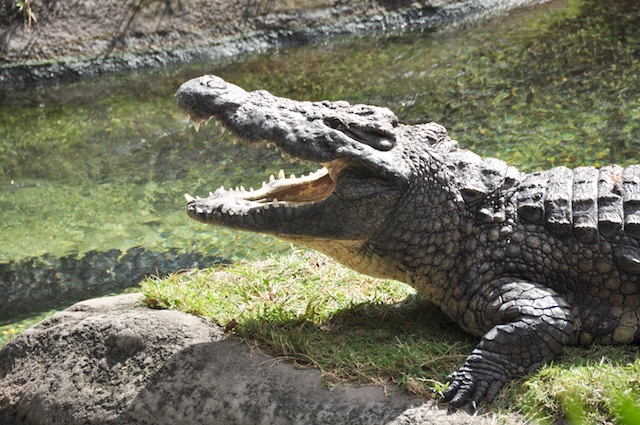
Yawning (panting?) crocodile
We learned that these crocodiles can jump about 8 feet off the ground. So the next question, “How high are we standing above them?” The guides say “ten feet.” Our silent response “Ummm, okay, that’s nice…”
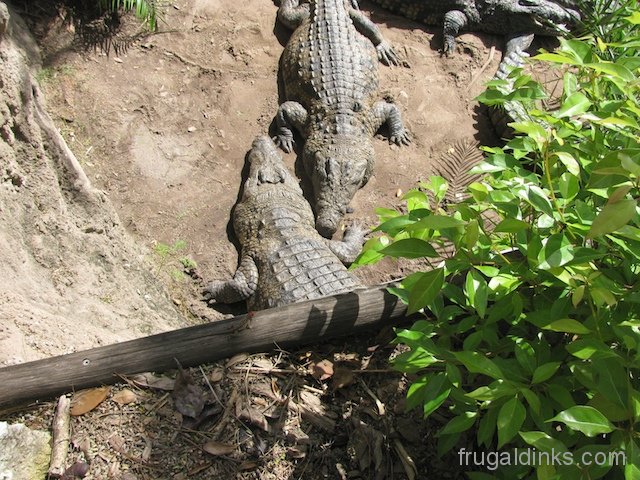
Yes, they’re REAL. Yes, they’re REAL BIG!
Yes, nick took these photos looking down. Next question, “when was the last time they were fed?” The guides were not sure, “what?! so we’re fresh meat?”
As we recall (we couldn’t carry notebooks to take notes), the crocodiles are only fed about once a week. They are VERY inactive (thus you rarely see one move when you do Kilimanjaro Safari). Being inactive they require very little food. We also learned that in the wild crocodiles only eat when they need to eat based on how active they are. Good to know BUT are these crocodiles hungry? Really, we are SUPER close.
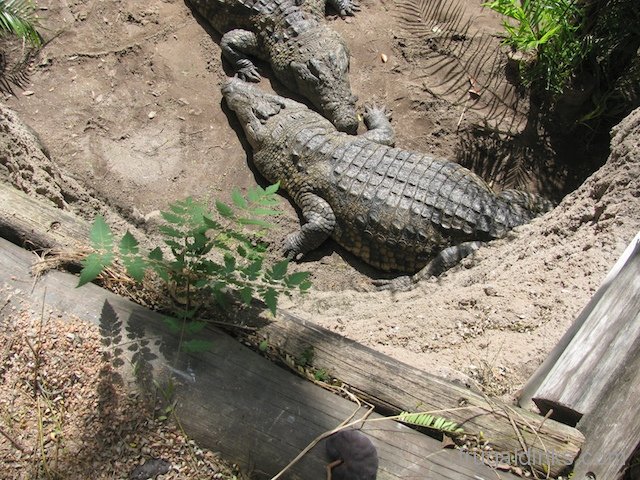
Look at that fat crocodile belly, right below us…
We didn’t try to count the crocodiles but there were plenty. Our party of 12 trekkers wouldn’t have been much more than a nice appetizer portion for these beasts.
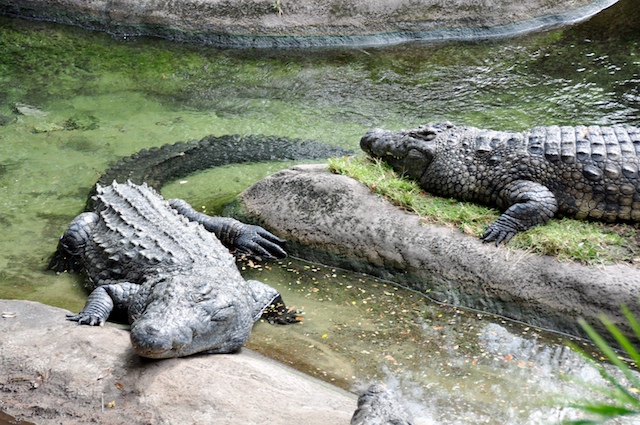
We’re crocodiles, we spend most of our time just lazing in the sun (doesn’t sound bad, now does it?)
We left the crocodile habitat and headed back out onto another trail. This trail lead to the edge of the savannah. We had a couple of savannah overlooks that we stopped at. The guides also pointed out info about the flora and fauna that we were passing through. Soon the trail came to an end and our personal safari vehicle and driver were waiting for us. The guides were not good at counting so they opted for another photo before we all took off our “gear” to make sure we all made it this far.
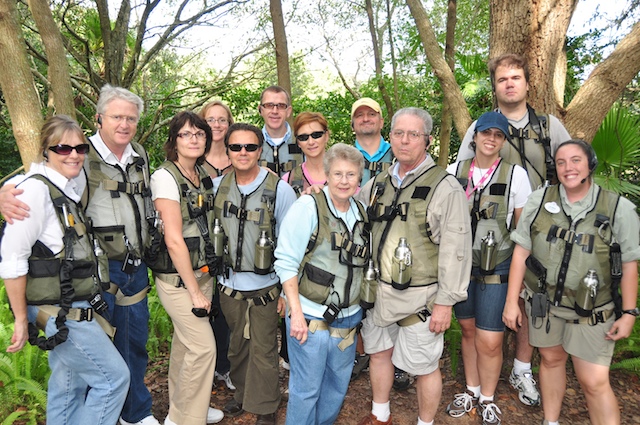
Yeah – we all made it. Better than that, nick crossed the bridges! Nick did have some problems over the hippo pool. At first, we were just over the “road” your regular safari truck goes on. Then it dropped off dramatically into the hippo pool. Because the bridges are built to be “rickety,” nick had to look down to hit the randomly spaced steps. When the visual height changed dramatically over the hippo pool, he had to stop and take a few breaths. Nick also took a short “yoga breathing” stop on the platform before crossing the crocodiles. He found crossing the crocodiles easier because the height was much less. He even stopped to take a look at the crocs while on the bridge! Nora didn’t want to stop for anything, “just get me off of this bridge.”
In our next post we’ll look at the first part of our savannah tour; that’s the african savannah (not the Savannah in Georgia).
nora & nick